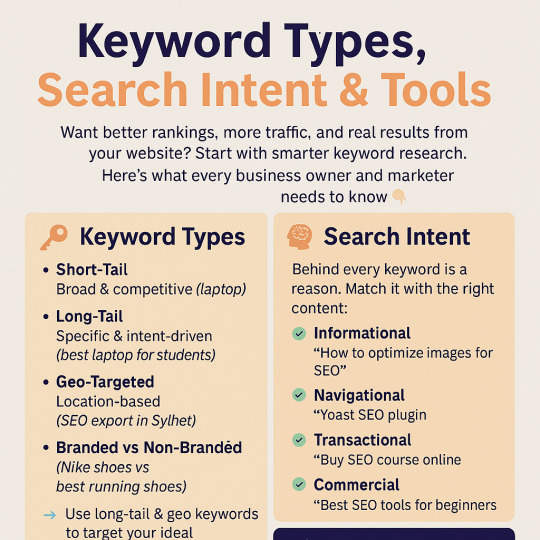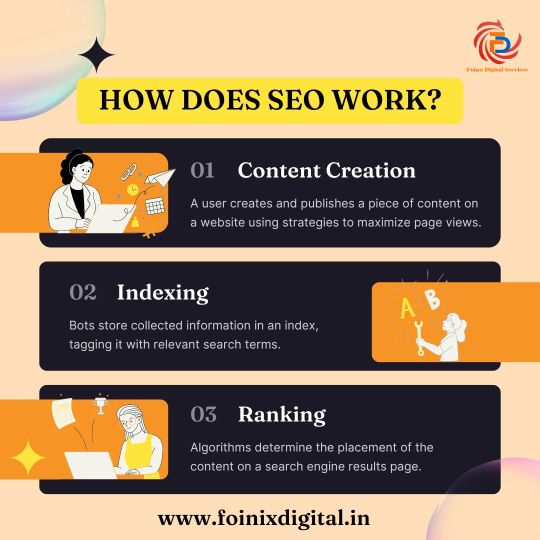#SEOBasics
Explore tagged Tumblr posts
Text
Keyword Types, Search Intent & Tools – Mastering the Basics of SEO
📌 Keyword Types, Search Intent & Tools – Mastering the Basics of SEO
Want better rankings, more traffic, and real results from your website?
Start with smarter keyword research.
Here’s what every business owner and marketer needs to know: 👇
🔑 Keyword Types
• Short-Tail – Broad & competitive (laptop) • Long-Tail – Specific & intent-driven (best laptop for students) • Geo-Targeted – Location-based (SEO expert in Sylhet) • Branded vs Non-Branded – (Nike shoes vs best running shoes)
👉 Use long-tail & geo keywords to target your ideal audience with less competition.
🧠 Search Intent
Behind every keyword is a reason. Match it with the right content: ✔️ Informational – "How to optimize images for SEO" ✔️ Navigational – "Yoast SEO plugin" ✔️ Transactional – "Buy SEO course online" ✔️ Commercial – "Best SEO tools for beginners"
📌 Search intent = better ranking & more conversions.
🛠️ Top Keyword Tools
🔧 Google Keyword Planner 🔧 Ahrefs / Semrush 🔧 Ubersuggest 🔧 AnswerThePublic 🔧 Google Trends
These help you find what people search, how often, and how competitive the terms are.
🚀 Final Tip:
SEO success starts with targeting the right keywords — with purpose, not guesswork.
Nail the keyword type, match the intent, use the right tools — and you’re already ahead.
#SEO #KeywordResearch #SearchIntent #SEOTools #SEOBasics #DigitalMarketing #LongTailKeywords #UserIntent #GrowOrganically

#SEO#KeywordResearch#SearchIntent#SEOTools#SEOBasics#DigitalMarketing#LongTailKeywords#UserIntent#GrowOrganically
0 notes
Text
Avoiding Common SEO Mistakes

When it comes to improving your website’s ranking, avoiding common SEO mistakes is just as important as applying the right strategies. Many businesses unknowingly sabotage their SEO performance by overlooking simple yet critical aspects. Here’s how to fix that.
7 Common SEO Mistakes to Avoid
Even with the best content, small SEO errors can hold your website back from ranking well. Here’s a list of common SEO mistakes and how to avoid them for better visibility.
1. Ignoring Mobile Optimization
With Google’s mobile-first indexing, failing to optimize your site for mobile is a major mistake. Ensure your site is responsive, fast-loading, and user-friendly on all devices.
2. Missing or Poor Meta Tags
Missing title tags and meta descriptions reduce your click-through rate. Use unique, keyword-rich metadata for each page to improve visibility and relevance.
🔗 Read More: https://amplewebsol.com/avoiding-common-seo-mistakes/
#AmpleWebsol#SEO2025#SEOMistakes#SEOTips#SearchRanking#DigitalMarketing#SEOBasics#WebsiteOptimization#SearchEngineOptimization
0 notes
Text
How To Learn SEO? A Step By Step Guide For Beginners

Unlock the secrets to online success with our comprehensive guide on how to learn SEO effectively. Whether you're a beginner trying to understand search engine algorithms or a budding digital marketer looking to sharpen your skills, this blog simplifies complex SEO concepts into easy-to-follow steps. Learn about keyword research, on-page and off-page optimization, technical SEO, and the latest best practices to boost your website’s visibility. Plus, if you're located in Haryana, don’t miss our specialized SEO Course in Ambala, crafted to provide hands-on training and expert mentorship. Start your journey toward becoming an SEO expert today by exploring this valuable resource. Read the full blog now on IntelliScholar and take the first step toward a successful digital career!
Call: +91-7494955535, +91-9996024708 Mail: [email protected]
#SEO#LearnSEO#SEOTips#DigitalMarketing#SearchEngineOptimization#SEOTraining#AmbalaSEO#SEOCourseAmbala#IntelliScholar#SEOBasics#OnPageSEO#OffPageSEO#TechnicalSEO#GrowOnline#SEOStrategy#SEOForBeginners#LocalSEO#MarketingCourse#DigitalSkills#SEOExperts
0 notes
Text
On-Page SEO Basics: Essential Elements to Boost Website Ranking
Learn the fundamentals of on-page SEO and how it can help improve your website’s visibility on search engines. This guide on on page SEO basics covers essential elements like meta tags, keyword placement, internal linking, image optimization, header structure, and content relevance. Whether you’re new to SEO or looking to optimize your website effectively, understanding on-page strategies is crucial for ranking success. Start applying these SEO basics to make your website more search engine friendly and user-focused. Perfect for beginners, digital marketers, and small business owners aiming for better Google rankings.
#OnPageSEOBasics#OnPageSEO#SEOOptimization#SEOBasics#WebsiteOptimization#SearchEngineOptimization#ContentOptimization#SEOExperts#DigitalMarketing#Infogentech#SEOforBusiness#SEOStrategy
0 notes
Text
🚀 Want to Rank Higher on Google in 2025? Discover the Top Tips for Optimizing Your Website for SEO — a complete guide for beginners, professionals, and local business owners! 💡
From keyword research to technical SEO, backlink building to mobile optimization — this article covers everything you need to boost traffic and improve rankings.
📖 Read the full guide now 👉 https://techfee.com/top-tips-for-optimizing-your-website-for-seo/
🔧 Also includes: ✅ SEO Tools Comparison ✅ Local SEO Tips ✅ Bonus Tips for Schools & Legal Firms ✅ Free SEO Quiz + Consultation Offer!
📣 Don't just guess your SEO—master it.
🔁 Save it. Share it. Start ranking.
#SEOtips#DigitalMarketing#SEOStrategy#SearchEngineOptimization#WebsiteTraffic#LocalSEO#ContentMarketing#TechFee#MarketingTips#GoogleRanking#SEOGuide#OnPageSEO#TechnicalSEO#Backlinks#WebsiteOptimization#BloggingTips#SEOBasics#GrowYourWebsite#MarketingForSmallBusiness
0 notes
Text
Top 10 Search Engine Optimization (SEO) Analysis Tools
If you're new to search engine optimization, choosing the #best_SEO_tools_for_beginners can make a big difference in how quickly you learn and succeed. These tools simplify complex SEO tasks like keyword research, competitor analysis, and website audits. Many of the top SEO analysis tools free not only provide valuable insights but also help you monitor your site's performance, fix technical issues, and improve your rankings—all without spending a dime. Whether you're running a blog, an eCommerce site, or a business website, these tools are a great starting point for your SEO journey.
0 notes
Text

📘 SEO isn’t magic—it’s strategy! Master the Basics of SEO Optimization for better search visibility. 🔎 Need help? Let our experts guide you. Visit: https://hireinanydomain.com/hire-seo-expert/
0 notes
Text

What is technical SEO?
It focuses on optimizing website structure and performance, like site speed, mobile-friendliness, and indexing.
#TechnicalSEO#SEO#SEOTips#SEOBasics#SearchEngineOptimization#DigitalMarketing#MarketingTips#SEOStrategy#WebsiteOptimization#WhatIsTechnicalSEO#SEOExplained#LearnSEO#SEOForBeginners
0 notes
Text
🚀 What is SEO & How Search Engines Work? 🔍 SEO (Search Engine Optimization) is the process of optimizing your website to rank higher on Google and drive organic traffic. There are 4 main types of SEO: ✅ On-Page SEO – content, headings, title, and meta ✅ Off-Page SEO – backlinks, social shares ✅ Technical SEO – site speed, schema, mobile-friendly ✅ Local SEO – Google Business Profile, NAP, citations 🔁 How Search Engines Work? 1️⃣ Crawl – Bots scan your site 2️⃣ Index – Pages get stored in Google’s database 3️⃣ Rank – Google shows the most relevant pages in search results 💡 The better your SEO, the higher your visibility!

0 notes
Text
SEO Backlinks: The Key to Unlocking Unstoppable Traffic!
Are you tired of seeing your website buried under competitors? Imagine the thrill of hitting the top page, where every click counts! SEO backlinks are your secret weapon. But here’s the twist—not all backlinks are created equal. The right ones will catapult your rankings; the wrong ones? Well, let’s not go there. Don’t let your business fade into the background. Ready to drive real results? Discover how the power of strategic backlinks can ignite your visibility and push your website to the spotlight. Why wait? Your ranking breakthrough starts now!

#SEOBasics#BacklinkPower#TrafficBoost#SEOJourney#OnlineVisibility#BacklinkMagic#RankHigher#TopSEOSecrets#SEOExpert#BuildAuthority
0 notes
Text
How Links Impact Organic Search Rankings: A Comprehensive Guide - Digital Cappuccino

Any company trying to flourish online now depends on natural search results in the current digital scene. Search engine optimisation (SEO) depends critically on internal and external links, which are essential for increasing your website's exposure. Leading digital marketing firm Digital Cappuccino Canada specializes in improving natural search success for companies in many different sectors. This extensive article will review the significance of links in SEO and how they directly affect organic search in Canada.
The Importance of Backlinks in Organic Search
Building authority for your website depends on backlinks—also called inbound links. Search engines like Google see a vote of confidence when a respectable site connects to your material. Excellent backlinks indicate that your website provides relevant and valuable material, thereby improving its ranking in natural search for Canada.
Still, only some backlinks are created equally. One backlink from an authoritative source—such as a news source or a business leader—carries much more weight than many links from less-known or irrelevant websites. Digital Cappuccino Canada stresses the need to develop connections with high-authority websites to get quality backlinks that improve your site's SEO.
How to Earn High-Quality Backlinks:
Create Shareable Content: Provide worthwhile, wise, or entertaining material others like to connect to.
Establish Relationships: To get references and mentions, network industry leaders, bloggers, and influencers.
Guest Blogging: involves writing educational pieces for other respectable websites and providing connections back to your own.
Utilize Social Media: Share your material on social media to raise awareness and possible backlinks.
Internal Links and SEO Layout
While internal links are equally crucial for website structure and organic search in Canada, backlinks are essential for external authority. Internal linking connects many pages of your website, increasing page discoverability by allowing search engines to crawl and index your website more effectively.
Besides enhancing user experience, a well-organized internal linking system guarantees that your most crucial pages get enough "link juice," or ranking authority. For instance, connecting one of your pages to other parts of your website will convey authority to other sites, enhancing their chances of ranking better if one of your pages gets many outside backlinks.
Guidelines for Internal Linking:
Link to the relevant page: Make sure the pages you are referencing provide value to the reader by relating to the material.
Use Descriptive Anchor Text: Descriptive anchor text can assist search engines and readers in grasping the material by providing background for the linked page.
Sort Important Pages: Emphasize connecting to sites—such as blogs, product pages, or services—that are crucial for your SEO plan.
Anchor Text and Its Importance for SEO
Natural search in Canada may be significantly influenced by anchor text, the clickable content in a hyperlink. Anchor text helps search engines deduce the nature of the linked website. Should the anchor text be correct and relevant to the material, it will assist in raising the ranking of the linked page for specific keywords.
Search engines will, therefore, connect your page with "best digital marketing strategies in Canada" if, for instance, a website links to your page using that precise phrase as the anchor text. However, overusing exact match anchor language might seem manipulative and result in fines. Maintaining good search engine optimisation requires a varied and natural anchor text profile.
Tips For a Powerful Anchor Text:
Diversify Your Anchor Text: Choose a range of anchor texts, including trademarked phrases, precise matches, and partial matches.
Maintain Its Relevancy: Verify that the anchor text captures the page it links to's contents.
Avoid Optimistic Behavior: Repetitive use of the exact match term might result in search engine penalties.
Low-Quality Links: Their Effects
Although good backlinks can significantly raise your organic search results in Canada, poor-quality connections may have the reverse impact. Links from spam, pointless, or low-authority websites could result in search engine penalties, therefore drastically lowering your ranks. Digital Cappuccino Canada always supports a top-notch, white-hat link-building plan emphasizing natural link acquisition.
How to Steer Clear of Low-Quality Links
Avoid Paid Links: Purchasing links runs Google's penalty risk.
Disavow Toxic Links: Remove or dissociate from low-quality links pointing to your site using Google's Disavow Tool.
Prioritize quality before quantity: A few high-authority connections are significantly more worthy than many poor-quality ones.
In Conclusion
All told, every effective SEO plan depends critically on links. Anchor text gives search engines context; internal links organize your page, and backlinks assist in building your site's authority. To avoid fines, it's essential to concentrate on obtaining high-quality, relevant connections and keeping a varied linking profile.
Our speciality at Digital Cappuccino Canada is creating robust SEO plans to improve Canadian natural search. Using superior link-building strategies, improved internal structures, and pertinent content development, our team of professionals emphasizes producing quantifiable outcomes. Ready to improve your ranking? Contact Digital Cappuccino Canada now to enable us to assist with achieving long-term SEO success.
FAQs
What distinguishes organic and sponsored search rankings?
SEO techniques including excellent content, backlinks, and internal linking boost organic search ranks without spending. Ads drive paid search rankings, where companies pay Google to show their website for specified keywords at the top of search results.
How long do link-building results take?
Timeframes for SEO ranking increases via link-building vary. Search engines usually take 3–6 months to index new high-quality backlinks, depending on their quality and SEO approach.
Can SEO be affected by social media?
Social media shares and engagement don't directly affect SEO results, but they may drive website traffic and backlinks. Your results may improve if respectable websites connect to your material due to your social media presence.
How does user involvement affect organic search rankings?
User engagement—page views, bounce rates, and site time—affects rankings. Because search engines use user behavior signals when deciding page quality and relevancy, engaging websites rank better.
How do broken links affect SEO?
Broken links hurt user experience and search engine trust, lowering SEO. To improve user navigation and SEO, audit your site often to repair broken links.
How crucial is website speed for SEO?
Website speed is important for ranking. Fast-loading websites improve user experience, thus search engines prioritize them. Slow websites have greater bounce rates, which hurts search rankings.
7. Is duplicating content bad for SEO?
Yes, duplicating material hurts SEO. Search engines like original material. Duplicate material may make it hard for search engines to index, lowering rankings and SEO performance.
#SEO#LinkBuilding#Backlinks#OrganicSearch#DigitalCappuccino#DigitalMarketing#SEOCanada#InternalLinks#AnchorText#SearchRankings#SEOStrategy#ContentMarketing#BacklinkStrategy#SearchEngineOptimization#LinkJuice#SEOGuide#WebsiteRanking#HighQualityLinks#SEOBasics#MarketingTips#Digital Cappuccino Canada#Organic Search In Canada
0 notes
Text

3 𝐑𝐞𝐚𝐬𝐨𝐧𝐬 𝐒𝐦𝐚𝐥𝐥 𝐁𝐮𝐬𝐢𝐧𝐞𝐬𝐬 𝐎𝐰𝐧𝐞𝐫𝐬 𝐃𝐨𝐧’𝐭 𝐎𝐩𝐭𝐢𝐦𝐢𝐳𝐞 𝐓𝐡𝐞𝐢𝐫 𝐖𝐞𝐛𝐬𝐢𝐭𝐞𝐬 𝐟𝐨𝐫 𝐒𝐄𝐎:
𝐋𝐚𝐜𝐤 𝐨𝐟 𝐊𝐧𝐨𝐰𝐥𝐞𝐝𝐠𝐞: Many small business owners are unaware of the basics of SEO and how it can benefit their business. 𝐓𝐢𝐦𝐞 𝐂𝐨𝐧𝐬𝐭𝐫𝐚𝐢𝐧𝐭𝐬: SEO often seems like a time-consuming process that requires constant attention. 𝐅𝐞𝐚𝐫 𝐨𝐟 𝐍𝐨𝐭 𝐒𝐞𝐞𝐢𝐧𝐠 𝐑𝐞𝐬𝐮𝐥𝐭𝐬: There’s concern that the investment in SEO won’t yield immediate tangible results.
Here's the solution:
𝐒𝐭𝐞𝐩 1: Start with the basics—learn fundamental SEO principles through free online resources. 𝐒𝐭𝐞𝐩 2: Set aside just 30 minutes a day dedicated to SEO tasks, making it a manageable part of your routine. 𝐒𝐭𝐞𝐩 3: Utilize free or affordable SEO tools like Google Analytics and Google Search Console to track progress. 𝐒𝐭𝐞𝐩 4: Focus initially on easy wins, such as optimizing on-page elements like title tags, meta descriptions, and using relevant keywords.
𝐒𝐮𝐦𝐦𝐚𝐫𝐲 𝐨𝐟 𝐁𝐞𝐧𝐞𝐟𝐢𝐭𝐬:
• Higher organic traffic to your website. • Improved search engine rankings. • Greater online visibility for your business. • Enhanced user experience, leading to better engagement.
Take the first step towards transforming your website today!
I can’t wait to share more actionable SEO tips and strategies with you soon. Your journey to better online visibility starts here!
Ps. In the next post, I’ll dive into a real-life case study that shows how these steps helped a local perfume shop doubled their traffic in just 2 months. Don’t miss it!
#SEO#SmallBusiness#WebsiteOptimization#DigitalMarketing#SEOBasics#MarketingStrategy#OnlineVisibility#SEOTips#BusinessGrowth#OrganicTraffic#UserExperience#TimeManagement#SEOJourney#SEOCaseStudy#GoogleAnalytics#GoogleSearchConsole#OptimizeYourSite#SEOSuccess#LearnSEO#SEOForBusiness#SEOHelp
0 notes
Text
SEO Explained: What Is Search Engine Optimization?
1 note
·
View note
Text

𝐒𝐞𝐚𝐫𝐜𝐡 𝐄𝐧𝐠𝐢𝐧𝐞 𝐎𝐩𝐭𝐢𝐦𝐢𝐳𝐚𝐭𝐢𝐨𝐧
▶️ Keyword Research and Optimization ▶️ Quality Content Creation ▶️ Technical SEO ▶️ Backlink Building ▶️ Analytics and Monitoring
𝐌𝐨𝐫𝐞 𝐈𝐧𝐟𝐨: https://www.weblinkindia.net/digital-marketing/search-engine-optimization.htm
#WeblinkIndia#Weblink#SEO#SearchEngineOptimization#DigitalMarketing#SEOStrategy#SEOExpert#SEOTips#SEOTools#SEOAgency#SEOTrends#SEORanking#OnlineMarketing#SEOHelp#SEOTechniques#SEOCompany#SEOBasics
0 notes
Text
SEO basics course
If you're new to search engine optimization and want to build a strong foundation, the SEO basics course at Digi Code Nexus is the perfect starting point. This course introduces you to essential SEO concepts, such as keyword research, on-page optimization, and meta tags. You'll also learn about the importance of content quality and site structure in achieving higher search engine rankings. With Digi Code Nexus, you'll receive expert guidance and hands-on practice to solidify your understanding. Join our SEO basics course to kickstart your journey into the world of SEO and set the stage for a successful digital marketing career.

#SEOBasics#DigitalMarketingCourse#KeywordResearch#OnPageOptimization#MetaTags#ContentQuality#SiteStructure#SEOTraining#BeginnerSEO#DigitalMarketingCareer
0 notes
Text

HOW DOES SEO WORK?
Content Creation: A user creates and publishes a piece of content on a website using strategies to maximize page views.
Indexing: Bots store collected information in an index, tagging it with relevant search terms.
Ranking: Algorithms determine the placement of the content on a search engine results page.
Foinix Digital Services
#seo#searchengineoptimization#digitalmarketing#onlinemarketing#marketingtips#seotips#seohacks#seoservices#seobusiness#seomarketing#seotools#seotutorial#seotraining#seosecrets#seoguide#seobasics#seoforbeginners#seotrends#seoupdates#SEOsuccess#foinixdigitalservices
0 notes